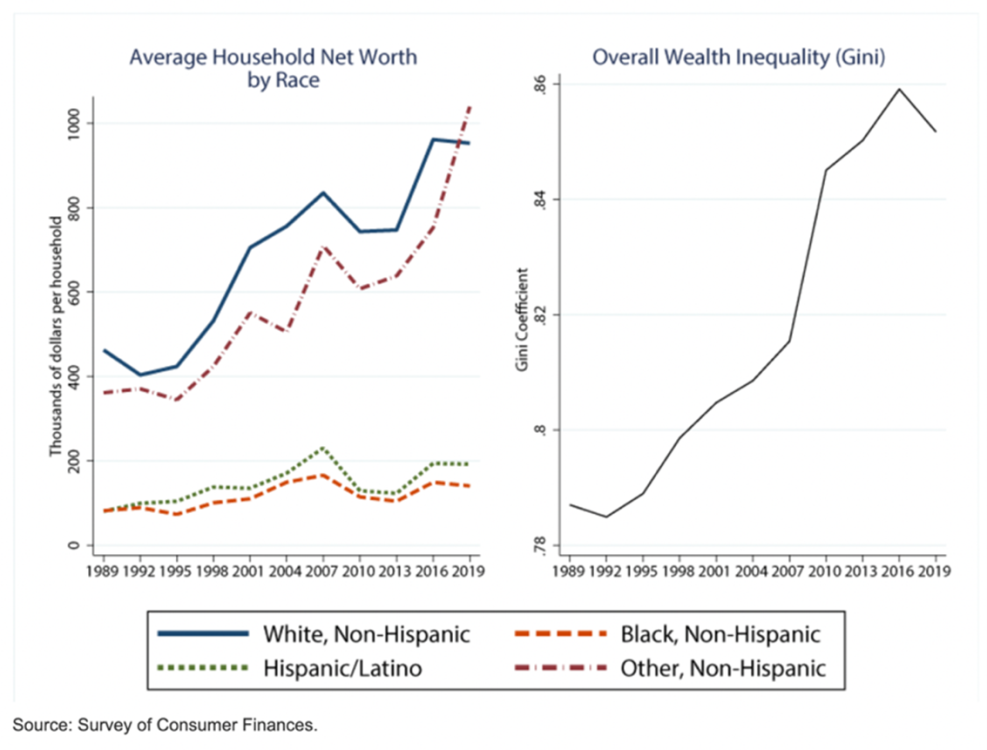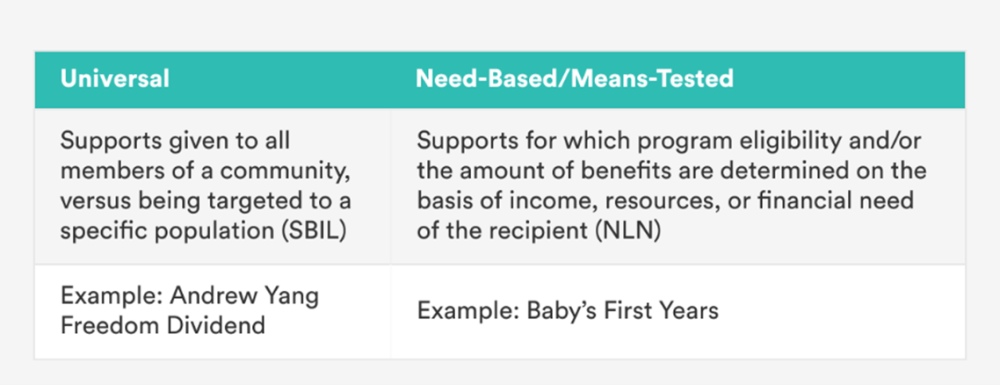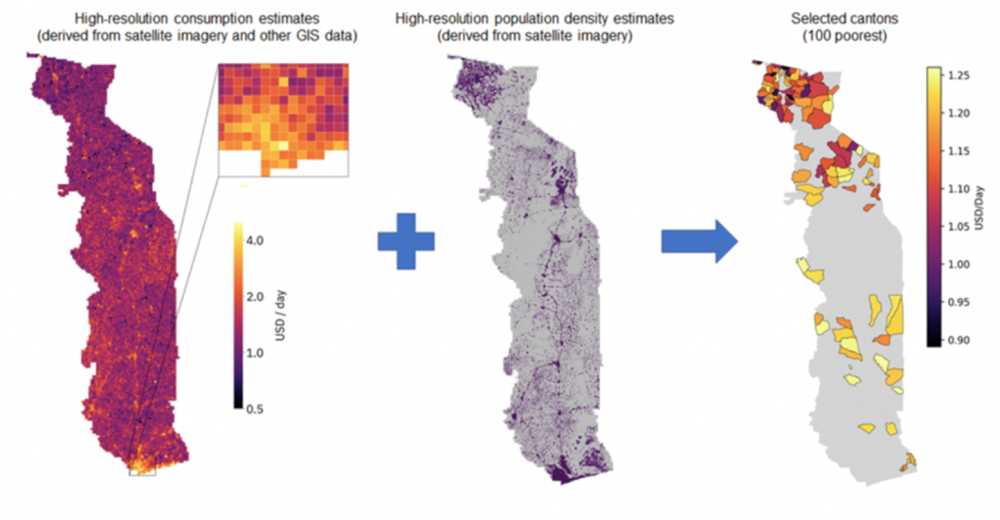 The LSE Phelan US Centre’s Capitalism Essay Competition asked LSE Master’s students to address the question, “How should the United States work to shape the future of capitalism in this age of insecurity?” In this runner-up essay, Yazmin Baptiste highlights the history of racial capitalism in the US, and argues that to shape the future of capitalism, the US should establish unconditional guaranteed income programs. Using evidence from case-study examples in the US state of Georgia and Togo, they write that these programs will lay the foundation for dismantling the systemic inequalities inherent in capitalism.
The LSE Phelan US Centre’s Capitalism Essay Competition asked LSE Master’s students to address the question, “How should the United States work to shape the future of capitalism in this age of insecurity?” In this runner-up essay, Yazmin Baptiste highlights the history of racial capitalism in the US, and argues that to shape the future of capitalism, the US should establish unconditional guaranteed income programs. Using evidence from case-study examples in the US state of Georgia and Togo, they write that these programs will lay the foundation for dismantling the systemic inequalities inherent in capitalism.
In contemplating the concept of dignity, one envisions the freedom to make personal choices, a semblance of control over destiny, and moments of tranquility amid life’s chaos. This exploration serves as a compass, guiding us toward an examination of capitalism’s future and the role the United States plays in shaping this narrative. To embark on this journey, a foundational understanding of capitalism becomes imperative.
Coined by Cedric Robinson of the University of California, he defines all capitalism as racial capitalism which is the accumulation of wealth through severe inequality, notably exploiting marginalized groups. Historical echoes of this exploitation, from the Atlantic Slave Trade to Jim Crow laws, still reverberate in contemporary challenges such as the prison industrial complex and gentrification. Alarming statistics from the US Federal Reserve (Figure 1) highlight the persistent racial wealth gap, revealing that Black and Hispanic households earn half as much as their White counterparts. This historical backdrop sets the stage for the US to redefine its role in addressing global inequities through intentional wealth redistribution.
Figure 1 – Household net worth and income, by race and ethnicity

Source: Federal Reserve
Unconditional Guaranteed Income: A Catalyst for Systemic Change
Since assuming the mantle of the world’s largest economy in 1890, the US has held a unique position of influence. Acknowledging the racial inequities embedded in its economic ascent, those in power are poised to lead the charge in dismantling global disparities through strategic wealth redistribution. To shape the future of capitalism, the US must scrutinize and deconstruct its capitalist structures by engaging in unconditional guaranteed income programs for its citizens while fostering similar opportunities on the global stage. Leveraging advanced targeting methods, including machine and deep learning, alongside human insight, can lay the foundation for dismantling the systemic inequalities inherent in capitalism.
Diverging from the approach of Universal Basic Income (UBI), unconditional guaranteed income programs present a targeted strategy. Supported by over 300 studies, these initiatives demonstrate that cash payments to impoverished households yield multifaceted benefits, spanning savings, homelessness, nutrition, mental health, intimate partner violence, health outcomes in humanitarian settings and more. Not only are these programs effective, but they also are a cost-effective model, streamlining the delivery of benefits compared to traditional social programs.
Figure 2 – The difference between UBI and Guaranteed Income

Source: New America
Programmatic success lies in operational success.
The intrinsic connection between unconditional guaranteed income programs and the deconstruction of capitalism with a racial justice lens is solidified through the meticulous operationalization of these initiatives. The evidence gleaned from successful case studies exemplifies the effectiveness of blending community-centered strategies with advanced targeting methods, ensuring a comprehensive reach within the intended population.
Take, for instance, the groundbreaking approach adopted in Togo. Through the strategic integration of machine learning algorithms, satellite imagery, and nationally representative survey data, a paradigm shift occurred in the identification of recipients. The utilization of cutting-edge technology facilitated the creation of poverty maps, offering a nuanced understanding of the socioeconomic landscape in rural Togo. This innovative approach not only validated the need but also ensured that the targeted population received the intended benefits. To promote community trust in the program as well, community leaders ensured the program’s validity which also increased awareness to all community members to promote saturation.
Figure 3 – Prioritizing the Poorest Areas in Togo

Source: Innovations for Poverty Action
The success story from Togo is not an isolated incident; it serves as a blueprint for transformative change, demonstrating that technological innovation can be a powerful tool in addressing systemic inequalities. Moreover, this model is not confined to a specific geographic context.
In the United States, a notable example arose in Georgia in which 650+ women are receiving an average of $850 monthly for two years. Just six months into the program, researchers found that those who needed to skip or reduce meals dropped by 32 percent and those who were unable to pay their utility bills on time decreased by 24 percent. What this program shines in though is its ability to ensure program participants’ well-being throughout the two years. In addition to monthly text messages ensuring participants received their transfers with no issues, more in-depth support is given to those who request it, connecting them with other community resources that they may qualify for.
Equity’s Gateway: Unveiling racial capitalism and the promise of guaranteed income.
The lens of racial capitalism serves as a crucial compass in our exploration of the transformative potential of unconditional guaranteed income programs. Understanding the historical context of wealth accumulation through severe inequalities, particularly within marginalized groups, is paramount. The very fabric of racial capitalism, woven with the threads of exploitation, underscores the urgency for innovative solutions. Moreover, its unconditional nature fosters a heightened level of trust between policymakers and constituents, reinstating a sense of dignity. This approach reflects the societal belief that our communities are best equipped to identify and prioritize the most pressing needs for investment.
Unconditional guaranteed income programs emerge as a beacon of change in dismantling the structures perpetuated by racial capitalism. By acknowledging the persisting racial inequities, we can strategically design and implement targeted initiatives that address the root causes. The success of these programs hinges on an operational framework that marries advanced targeting methods with community-centered approaches, ensuring that those historically marginalized are the focal point.
In the intersection of racial capitalism and guaranteed income lies the opportunity to reshape the narrative of capitalism itself. By addressing economic disparities at their core, these programs become not just a financial safety net but a tool for societal transformation. The concrete link between defining racial capitalism and the efficacy of unconditional guaranteed income programs is the linchpin in creating a future where dignity is not a privilege but a guarantee for all. Through this intersection, we forge a path towards a more just, equitable, and dignified society, dismantling the oppressive structures that have persisted for far too long.
- Photo by Nick Fewings on Unsplash
- Please read our comments policy before commenting.
- Note: This article gives the views of the author, and not the position of USAPP – American Politics and Policy, nor the London School of Economics.
- Shortened URL for this post: https://wp.me/p3I2YF-dCz





